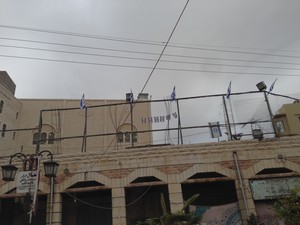Boycott Israeli Settlement Products
Boycotting Basics
WHat is a BOYCOTT?
A boycott is a movement to stop buying certain products as a form of protest. Not buying products from companies puts pressure on these companies to improve their ethical standards, and draws attention to their unethical practices.
WHY BOYCOTT?

Israeli settlers live in homes on top of once Palestinian-owned buildings
The Presbyterian Church (U.S.A.) supports Israel’s right to be an independent nation with secure borders. The church also hopes for a “two state solution” in which there is an Israeli state and a Palestinian state which both are economically viable. The church has been calling for many years for a sustainable peace between the Christians, Jews, and Muslims in Israel and Palestine, but Palestinian land is still under illegal occupation by Israel. After much prayer, study, and discussion, the 220th General Assembly voted to approve a limited boycott focused on products from Israeli settlements in the West Bank and East Jerusalem. A boycott is a nonviolent way to make our voice heard and encourage just actions. Currently, Israeli settlement colonies are being scattered across the Palestinian West Bank and are expanding rapidly. These settlements are illegal under international law, and not only deprive Palestinians of their land, but also make a “two state solution” increasingly difficult.
The boycott is not against the government, culture, or people of Israel, but only against private companies that profit from occupying Palestinian land. This boycott is limited to products that directly exploit Palestinian land and resources. It is just one step in an ongoing movement for fair treatment and peace for Israelis and Palestinians, but it is part of our effort to say that enough is enough. This is a concrete action that can put pressure on occupiers to follow international law and stop exploiting their neighbors through military occupation and illegal settlements within Palestine.
For more information, read GA Call to Boycott: Who, What, Where, Why
FACTS ABOUT SETTLEMENTS
According to international law such as the Fourth Geneva Convention and the Hague Convention, no occupying power can transfer civilians to occupied land or extract resources from it. Instead, the occupying nation is encouraged to establish a stable government in the occupied territory so that the occupying military forces can leave.
The Israeli army occupied the West Bank of Palestine, East Jerusalem, and the Gaza strip during the Six Day War of 1967. This supposedly temporary occupation has lasted for 45 years, and has made the lives of Palestinians increasingly difficult. Over 500,000 Israeli citizens now live in illegal residential communities within Palestine, and many Israelis have expropriated land for factories and farms. The Israeli settlements in Palestine also have greater access to much-needed water and transportation roads.
For more information on settlements, visit the American Friends Service Committee website

